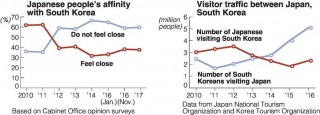Loading
Search
▼ Japan to Refuse Renegotiations
- Category:Event
The Japanese government hit back at South Korea’s report examining the Japan-South Korea accord on the issue of comfort women. Even if the administration of South Korean President Moon Jae In calls for Japan to renegotiate the accord based on the report in the future, Japan will never agree to such a request.
Commenting on the report, Foreign Minister Taro Kono, who was on a visit to Oman, clearly expressed his disappointment Wednesday, saying: “It’s quite regrettable. We are working to move toward positive bilateral relations. However, if South Korea says it does not know what the former administration did, it will be difficult for us to do anything in the future.”
Liberal Democratic Party Policy Research Council Chairman Fumio Kishida, who was the foreign minister when the accord was signed, said, “The procedures for the Japan-South Korea accord were appropriate.”
When Japan and South Korea reached the agreement in 2015, Japan strongly insisted on clearly stipulating the “final and irreversible resolution of the comfort women issue” in the accord.
This is because South Korea repeatedly brought up the issue in a unilateral manner in the past. Since 2015 was a milestone year that marked the 70th anniversary of the end of World War II, Prime Minister Shinzo Abe made the political decision hoping to put an end to the issue of comfort women and establish future-oriented relations with South Korea.
However, over the past two years in South Korea, understanding of the bilateral accord has not spread. Rather, there have been forces working against it. In December last year, a South Korean civil group opposing the accord installed a statue of a girl symbolizing comfort women in front of the Japanese Consulate in the southern South Korean city of Busan.
The Moon administration has announced such plans as establishing a national memorial day for comfort women and building a “comfort women” museum. The Japanese side is increasingly concerned about the possibility of South Korea scrapping the accord, encouraged by anti-Japan public opinion, according to a senior Foreign Ministry official.
Such developments in South Korea also cast a dark shadow over Japanese people’s view of South Korea. According to Cabinet Office surveys, the percentage of respondents who “do not feel affinity toward South Korea” significantly surpassed that of those who “do.” In addition, the number of Japanese people visiting South Korea has mostly declined since 2012.
The Japanese side will continue to ask for the South Korean government to steadily implement the accord. If the Moon administration shows a negative response, Japan will likely decline South Korea’s invitation for Abe to visit the country in line with the Pyeongchang Winter Olympics in February 2018. Japan also is considering taking countermeasures, such as having Yasumasa Nagamine, ambassador to South Korea, temporarily return to Japan.
However, amid the increasing threat of North Korea, if the rift between Japan and South Korea further deepens, it will be to North Korea’s advantage. In reality, Japan wants to avoid a crucial confrontation with South Korea, so it will carefully consider how to deal with the country.
- December 30, 2017
- Comment (0)
- Trackback(0)


